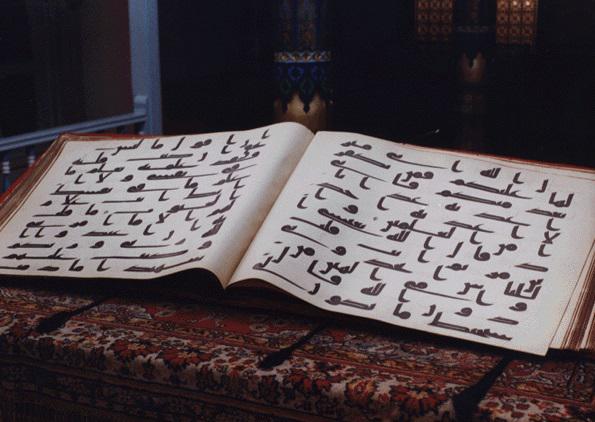بســم
اللــه الرحمــن الرحيــم
والصلاــة
والسلاــم علــى نبيــه الكريــم
وعلــى
اهــل بيتــه الطيبيــن الطاهريــن المظلوميــن
والعاقبة
للمتقين
I begin
this new series of articles regarding juristic issues, or to be more precise,
the principles of Islamic jurisprudence especially pertaining to leadership of the
Muslim community and political theory. In this particular entry, I wish to
discuss the source of guidance and truth. It is quite common to hear nowadays
that the ultimate source in Islam is the Qur’an, the divinely-revealed Scripture.
This is considered the ma’khadh (source) of Islam absolutely by many
Muslims nowadays. I say, however, that the ultimate source of Islam, meaning,
the means to guidance and knowledge of what Islam is, is the Prophet Muhammad (sall
Allahu alayhi wa aalihi wasallam). I can present many proofs and arguments
in favor of this, but shall restrict myself here to only a few. Firstly, the
Prophet Muhammad (sall Allahu alayhi wa aalihi wasallam) was the one to
whom the holy Qur’an was revealed. In other words, the Qur’an was not revealed
upon the heart of each and every individual Believer, but it was revealed to a
single Prophet, who then conveyed its contents to the people:
قُلْ
مَن كَانَ عَدُوًّا لِّجِبْرِيلَ فَإِنَّهُ نَزَّلَهُ عَلَىٰ قَلْبِكَ بِإِذْنِ
اللَّـهِ مُصَدِّقًا لِّمَا بَيْنَ يَدَيْهِ وَهُدًى وَبُشْرَىٰ لِلْمُؤْمِنِينَ
Say: Whoever is an enemy to
Gabriel, for verily he brought it down upon your heart [O My Prophet!] by the
permission of Allah, confirming what was before it and a guidance and glad
tidings for the believers.
(Sura 2:97)
The
words alaa Qalbika “upon your heart” in the singular, a direct address to
the Prophet Muhammad (sall Allahu alayhi wa aalihi wasallam) is one of
the proofs that the Quraan was revealed to him, and not revealed collectively
upon the hearts of the believers. Similarly, Allah says:
وَإِنَّهُ
لَتَنزِيلُ رَبِّ الْعَالَمِينَ ﴿١٩٢﴾ نَزَلَ بِهِ الرُّوحُ الْأَمِينُ ﴿١٩٣﴾
عَلَىٰ قَلْبِكَ لِتَكُونَ مِنَ الْمُنذِرِينَ ﴿١٩٤﴾
And verily it is a Revelation of the Lord of the
worlds.
The trustworthy Spirit has brought it down.
Upon your heart (O My Prophet!) that you may be of the
warners.
(Sura 26:192-194)
Having established that the
Quraan was revealed upon a single heart, the pure heart of our holy Prophet
Muhammad (sall Allahu alayhi wa aalihi wasallam), and was not a
collective revelation to the hearts of the Believers, it is quite obvious that
in order to access and attain the Quraan one must take the Prophet Muhammad (sall
Allahu alayhi wa aalihi wasallam) as its medium and source. Unless the
Prophet Muhammad says “this is the Quraan” it is impossible for one to know
what the Quraan even is. Additionally, consider the
fact that when the Prophet Muhammad (sall Allahu alayhi wa aalihi wasallam)
was first commanded by Allah to invite people to Islam, he was ordered to begin
with his nearest kin:
وَأَنذِرْ
عَشِيرَتَكَ الْأَقْرَبِينَ
And warn your closest kindred
(Sura 26:214)
This he
did, in the well known episode known as the da’wat al-Ashira. The
Prophet (sall Allahu alayhi wasallam) had various clans of the Quraysh
assembled on the mount of al-Safa, and asked them:
أَرَأَيْتُمْ إِنْ أَخْبَرْتُكُمْ أَنَّ
خَيْلاً تَخْرُجُ مِنْ سَفْحِ هَذَا الْجَبَلِ أَكُنْتُمْ مُصَدِّقِيَّ
“If I
inform you of a cavalry coming up the side of this mountain, would you believe
me?”
To which
all the people assembled replied:
مَا جَرَّبْنَا عَلَيْكَ كَذِبًا
“We have
never known you to tell a lie.”
It was
then that the Prophet Muhammad (sall Allahu alayhi wasallam) conveyed
the divine message with which he was sent in the following words:
فَإِنِّي نَذِيرٌ لَكُمْ بَيْنَ يَدَىْ
عَذَابٍ شَدِيدٍ
“So verily
I am a warner to you of a coming severe punishment.”
Consider
the fact that in this, his first da’wa to the people since being
appointed a Prophet and Apostle, sayyidina Muhammad (sall Allahu alayhi
wasallam) did not invite them to believe in the Quran, but rather, invited
them to believe in his person as a Nadhir (harbinger), warning them of an
imminent divine punishment. In other words, belief in the Prophet’s person as
being a Prophet and Apostle of God necessarily precedes belief in the Scripture
that was revealed to him. It is fundamentally an incorrect approach to first
believe in the Scripture and then derive belief in the Prophet Muhammad based on
that Scripture. In fact
there are many fundamentals of Faith, particularly the very creed, the two
testifications through which one enters into Islam, that a Believer must
necessarily be acquainted with before even laying hands on a copy of the holy
Quraan. The creed of Islam is:
لــا
الــه الــا اللــه
محمــد
رسوــل اللــه
There is none worthy of worship
except Allah
Muhammad is the Apostle of Allah
Interestingly,
this formula is not found as a single statement in the Quraan, yet the vast
majority of Muslims consider it the most fundamental and basic teaching of
their Faith. It is a very powerful evidence that belief in this Kalima
or creed not only precedes but is independent of the Quran, a strong refutation
of particularly those so-called “Quranist” sects which consider the text of the
Quran as the sole and ultimate source of Faith and religious knowledge. Iman
or faith is learnt before one even approaches the Quran, proving that the
knowledge of Iman precedes and is independent of the Quran, as the sahabi Jundub
b. Abd Allah (radi Allahu anh) said:
كُنَّا مَعَ النَّبِيِّ ـ صلى الله عليه
وسلم ـ وَنَحْنُ فِتْيَانٌ حَزَاوِرَةٌ فَتَعَلَّمْنَا الإِيمَانَ قَبْلَ أَنْ
نَتَعَلَّمَ الْقُرْآنَ ثُمَّ تَعَلَّمْنَا الْقُرْآنَ فَازْدَدْنَا بِهِ
إِيمَانًا
“We were
with the Prophet (sall Allahu alayhi wasallam) and we were strong youths,
so we learned Faith before we learned the Quran, then we learned the Quran and
our Faith increased thereby.” (Sunan Ibn Maja #61)
What is
meant by learning Faith here, a knowledge that is independent of and precedes
knowledge of the Quran, is the learning of the belief in the Oneness of Allah,
the belief in the Angels like Gabriel and Michael, the belief in the Scriptures
like the Torah and the Quran as being a divine revelation, the belief in the
Prophets and Apostles, and the Last of the Prophets Muhammad (peace be upon
him) the belief in the Hereafter and resurrection (Judgment Day, Heaven and
Hell), and belief in the divine decree. All of this is necessarily learned
before one picks up the Quran and starts to read it. Furthermore, the reader
should note that if it is the Quran which is the ultimate and primary source of
the Faith of Islam, then the Kalima would certainly state:
لا
اله الا الله
القرآن
كتاب الله
“The Quraan is the Book of Allah”
In lieu
of “Muhammad is the Apostle of Allah” or at least before it.





















